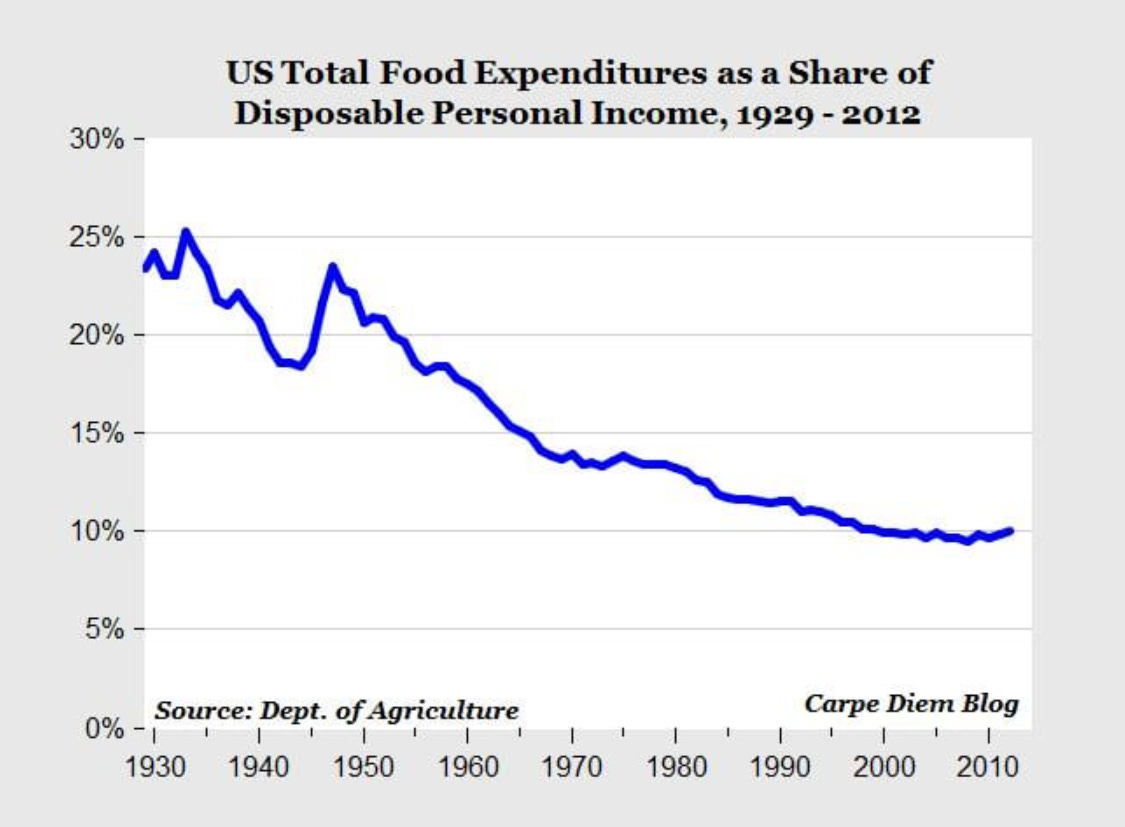On the winding path of progress there are periods when fields are fertile for activity, and times when they’ve ossified into their end state. The iterative trials reach a point of convergence on what the desired object, method, service etc. should be.
Take utensils for example. Somewhere around the 1700 - 1800s The West adopted the trio of spoon, fork, knife and we reached the conclusion of bedrock tableware. I’m sure some people have tried to introduce new improvements to these (i.e. the spork), but nothing particularly revolutionary has broken through for regular use or is likely to break through in the future. (Barring an invasion from China wherein we all start learning Mandarin and eating with chopsticks).
A more recent case of this phenomenon would be cell phones. There were about 20 years there of exciting tinkering, but now we more or less have something close to the end-state of the device with modest improvements rolled out occasionally.
We’re Finally Eating Good
If you threw me in time machine and sent me back a few centuries, I think one of the more difficult things to cope with would be the utter lack of food options compared to today. The bounty culinary possibilities available for a reasonable price in the developed world is really miraculous.
From the industrial revolution onwards we’ve been on just a steady climb of expanding the amount of food available to the common man and establishing the dishes which will become staples for the rest of time. Many of which did not exist until relatively recently.
The ice cream cone was allegedly popularized when a ice cream vendor ran out of cups at the 1904 World’s Fair and decided to start using wafers from another concessionaire as a substitute.
Chicken wings, which are now eaten by the billions annually, didn’t come into their current form until the mid 1960s when some people in Buffalo, NY decided to start deep frying some stuff after a long night at the restaurant.
The All-American Hot Dog as well has an origin that dates back to the turn of the century. Possibly from a sausage vendor who ran out of wax paper to serve them on and opted instead for a bun.
Basically in the last 150 years, if you got drunk and decided to play around in the kitchen there was a possibility that you could hit on a foundational food that would be enjoyed by millions and a symbol of national pride. There were all these happy accidents and tales of great whimsy. Stories though that are increasingly less common to hear about.
The fields were fertile then, it was a good tinkering era. Between the fusion of recipes via globalization and the capacity for production with industrialization it was the apex time to make new foods.
We’ve also done a great job refining dishes. We discovered the cheeseburger and then iterated on it thousands and thousands of times to create the best versions at various price points. The “hipster food revolution” of the 21st century was really the final polishing job. You can make fun of the $25 artisanal cheeseburger place, with millennials sipping IPAs on metallic stools, but you can’t deny that the food tastes pretty damn good.
What next?
It’s hard to imagine food getting significantly “better” than it is now. All of the secrets are now out in the open, any gains via globalization have been had. Some autistic Japanese guy could probably open the world’s best Uzbek restaurant if he so desired. The time when cultural exchange alone produced new wonders is reaching the point diminishing returns. Especially in the USA where the world has already entered en masse.
The fact that the tech-bros are trying to sell you Soylent™, vegan meat, and seafood made in a petri dish is probably indicative of the creative wall we are hitting in the culinary department. There will always be chefs trying to create the next “hot new dish” and experimenting in the fine dining arena, but I envision a world where my grandchildren will likely be eating a very similar diet to what I am today.
The same can’t be said for our grandparents. My grandmother has never eaten a taco (and never will). They came from an age when food was more scarce and less varied. Simply having a meal was enough and an achievement in itself for many. I’ve found if you talk to someone over the age about 80+ they typically still see eating out at a restaurant as something rather lavish, to be reserved for special occasions.
If we are truly at the end of the line for food progress, I have to say I’m quite content. Do we really need more than this? There’s so many avenues to take your tastebuds on a joyous ride. There’s plenty of healthy and nourishing foods if you seek them out. To go on much further from here in the realm of taste almost seems decadent and masturbatory.
I say the chefs can stand down. we’ve climbed the mountain, we’ve done the work as a society, now is the time to just sit back and enjoy the meal.









This is a twist on the theory of decadence//great stagnation: all the low hanging fruit for innovation and cultural change has been picked and so society has hit a new plateau where change occurs at a much slower pace. The broad forces that produced innovation have been spent.
We will get dishes that are trendy of course but not really new. Notice how many restaurants there are now serving deep fried brussel sprouts?
There probably is another boomlet of innovation coming once various local South Asian cuisines become more accessible to the masses. There just aren't many non Chinese who have mastered making authentic regional dishes of China to the point where they can experiment with brand new flavor profiles but this will happen. Same thing with Laotian, Malaysian and Indonesian dishes many of which would taste very different to an American palate.and are not even available outside of a few coastal cities. Even Indian is relatively new in much of US.
Think of a phenomenal spice cocktail like Old Bay which is an unlikely combination of nutmeg, cardamom, bay leaves and a whole lot else. It starts in Chesapeake and ended up on Navy ships all over the US. There's undoubtedly more like that to be discovered
I like the provocative twist at the end. Will we see other types of evolutions (in cooking or elsewhere)? Time will tell—but as with any good recipe, the best surprises come when we least expect them.